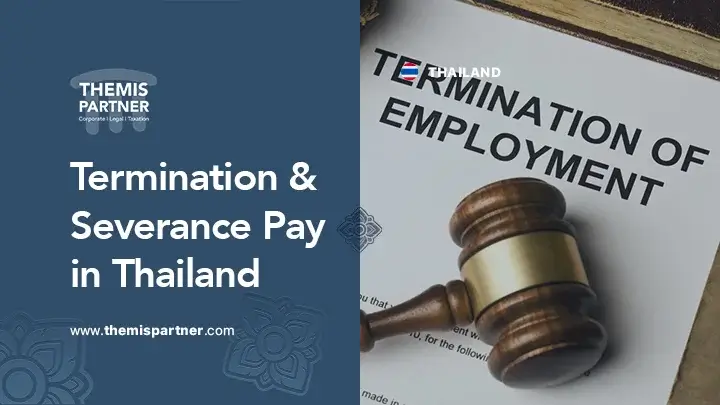Did you know that under Thailand Labour Law, employers can face penalties of up to 400 days’ wages for failing to meet termination or severance requirements?
Recent changes and stricter enforcement mean that every termination (no matter the reason) now demands thorough documentation, correct notice periods, and swift settlement of final payments to remain compliant.

If you are navigating employee exits, restructuring, or international contracts, this guide breaks down critical rules on dismissal procedures, notice, and severance.
Key Takeaways
- Termination must follow Thai Labour Law, distinguishing between “with cause” and “without cause” to determine eligibility for notice and severance.
- 30 days’ written notice is mandatory for terminations without cause, while no notice is needed for just-cause dismissals; payment in lieu is possible if immediate exit is required.
- Statutory severance pay applies to employees with over 120 days’ service, ranging from 30 to 400 days’ wages based on years worked, except for documented just-cause terminations.
- Final payments, including salary, unused leave, and severance, must be completed within three days of termination to avoid legal disputes and potential claims.
- Accurate documentation of misconduct, notice, and reasons for dismissal is critical for defending against wrongful termination claims and satisfying Labour Court requirements.
- Employer duties include issuing employment certificates and written explanations upon request, strengthening transparency and reducing dispute risks.
- Special scenarios like foreign staff or senior executives require additional regulatory notifications and timely compliance to prevent fines and visa issues.
- Probationary and temporary contracts have unique rules: no severance is due for under 120 days’ service, but all terminations still require proper notice and thorough record-keeping.
Table of Contents
-
Termination Under Thailand Labour Law
-
Severance Pay and Employee Entitlements
-
Notice Periods and Employer-Employee Protections
-
Wrongful Termination Risks
-
Terminations of Foreign Employees
-
FAQ: Termination and Severance Pay
-
Conclusion
Termination Under Thailand Labour Law
Lawful Grounds for Dismissal in Thailand
Termination under Thailand Labour Law falls into two categories: “with cause” (for serious employee misconduct) and “without cause” (for other business reasons).
Section 119 of the Labour Protection Act explicitly defines “with cause” grounds, including:
- Dishonesty or criminal acts towards the employer
- Intentional or reckless damage to company property
- Serious violations of workplace rules after prior written warning (except if severe)
- Unauthorized absence for three consecutive days
- Final court judgment of imprisonment, where relevant
Proper documentation and written warnings are essential when terminating for cause.
Employers frequently avoid disputes by recording details of misconduct and ensuring legal compliance. For authoritative criteria, see Thailand Department of Labour Protection and Welfare – Section 119.
Misconduct must be serious and well documented to support dismissal without severance.
Proper Procedure for Termination
Dismissing an employee “without cause” legally requires:
- At least 30 days’ written notice delivered before the next wage payment date
- Payment in lieu of notice, equal to one month’s wages, if immediate termination is preferred
- Observance of longer notice periods if a contract requires it
No notice is required for “with cause” cases. All timing must align with payroll cycles.
Strict procedures, clear records, and transparent communication protect both businesses and employees. On-the-ground compliance with Thailand Labour Law ensures reduced litigation risk and fair workplace outcomes.
Severance Pay and Employee Entitlements
Severance Calculation and Eligibility
Under Thailand Labour Law, employees terminated without cause after 120 days of service are legally entitled to statutory severance pay.
Severance is calculated based on years of continuous service:
- 120 days to less than 1 year: 30 days’ wages
- 1–3 years: 90 days’ wages
- 3–6 years: 180 days’ wages
- 6–10 years: 240 days’ wages
- 10–20 years: 300 days’ wages
- 20+ years: 400 days’ wages
Check Thailand Minimum Wage Rates 2025: Latest Updates.
Employees dismissed “with cause” (as defined in Section 119) or whose fixed-term contracts end properly are not eligible for severance.
For detailed legal background, reference the ILO – Termination of Employment Digest: Thailand.
Payments to Be Made at Termination
Upon termination, employers must pay within three days:
- All outstanding salary
- Unused annual leave
- Statutory severance (if applicable)
- Other accrued benefits per the contract
Deductions are allowed for lawful reasons, but disputes over final pay may result in Labour Court claims.
Key takeaway: Timely, proper severance and termination payments are essential to comply with Thai law and build workplace trust.
Notice Periods and Employer-Employee Protections
Notice Periods for Employment
Notice periods in Thailand Labour Law protect both employers and employees by setting clear expectations.
A minimum of 30 days’ written notice (one full pay cycle) is mandatory for regular employment terminations without cause, unless a longer period is stated in the employment contract.
Key scenarios include:
- Probationary employees: No statutory notice, but employers often use 30 days as best practice.
- **Senior managers and executives: **Contractual notice periods may exceed the legal minimum.
- Mass redundancies or business closure: Employers may face stricter documentary requirements or additional notifications.
Notice must be delivered before the next wage payment due date to take effect.
Partial or late notice is not compliant and may trigger additional payment in lieu and legal risk.
Employer Documentation and Certification
Employers must keep accurate termination records to mitigate disputes and regulatory scrutiny.
Upon employee request, you are legally required to:
- Issue a certificate of employment stating dates and position.
- Provide a written explanation of termination grounds.
Strong documentation of all communications and decisions is essential. Solid records are your best defense if a claim reaches the Labour Court.
Strategic internal workflows and checklists empower HR and leadership to act both fairly and efficiently.
Wrongful Termination Risks
Wrongful or Unfair Termination
Terminating an employee in Thailand without following prescribed legal steps can result in a wrongful dismissal claim.
Common reasons include:
- Skipping written notice or proper procedure
- Insufficient documentation for “just cause”
- Discriminatory dismissal based on protected characteristics
Employees may bring claims to the Labour Court for:
- Compensation for lost wages
- Reinstatement to their former position
- Additional damages for breach of Thailand Labour Law
Employers can protect themselves by:
- Keeping clear records of all termination steps
- Providing written explanations when requested
- Ensuring all decisions are nondiscriminatory and well-documented
Missed steps or lacking evidence can turn routine dismissal into costly legal action.
Consequences and Liabilities for Non-Compliance
Non-compliance with Thailand Labour Law may lead to immediate legal, financial, and reputational risks.
- Courts can order payment of full statutory severance and unpaid wages
- Damages may include up to 400 days’ wages for long-tenured workers
- Recent Labour Court judgments stress employer liability for inadequate documentation
To reduce risks, employers should:
- Regularly review and update termination protocols
- Train managers on due process and fair treatment
- Seek legal counsel for complex or high-profile dismissals
Proper documentation, timely payments, and strict adherence to Thailand Labour Law are essential to avoid wrongful termination claims and ensure compliance.
Terminations of Foreign Employees
Foreign Employees and Senior Executives
Termination of foreign employees and senior executives in Thailand requires careful regulatory compliance.
Employers must notify several authorities upon termination, including:
- The Immigration Bureau (for visa cancellation)
- The Social Security Office
- The Department of Employment (work permit revocation)
Severance can apply to expatriates and board-level staff unless the dismissal is for cause as defined by Section 119 of the Labour Protection Act.
For multinational employers, inconsistent local and international contract terms often create compliance risks or delays.
Probation Periods and Temporary Contracts
Probationary and temporary contracts introduce unique compliance steps.
Key rules include:
- No severance is due if employment ends during the first 120 days (the typical probation period).
- Fixed-term and agency contracts generally do not require severance when ending as scheduled and agreed by both parties.
- “Lawful dismissal during probation demands written notice, careful documentation, and clarity of reasons given.”
Employers should adopt practical frameworks to assess risk in non-standard contracts, including steps for documenting performance and following lawful procedures.
Proactive compliance for foreign staff, executives, and contract employees reduces disputes, protects business reputation, and avoids regulatory penalties.
FAQ: Termination and Severance Pay
Employees who resign voluntarily in Thailand are not entitled to severance pay under Thailand Labour Law.
All incidents, misconduct, or breaches cited as “just cause” for dismissal must be fully documented by the employer. Written records, warnings, and evidence are essential if a claim reaches the Labour Court.
Key Scenarios Requiring Employer Action
- No severance is owed for terminations with documented just cause (Section 119), such as dishonesty, serious violation of work rules, or consistent absence.
- Employers cannot lawfully dismiss employees during periods of sick leave or maternity leave without special legal justification.
- All outstanding pay, severance, and unused leave must be paid within three days of termination, or employees may pursue claims with Thailand’s Labour Protection and Welfare Office or Labour Court.
Fast Facts for Immediate Use
- Document every warning and infraction to protect your business in disputes.
- Claims for wrongful or unpaid severance can result in court-ordered compensation.
- Certificates of employment and reasons for dismissal must be provided upon employee request.
Employers should prioritise compliant documentation and swift settlement of all final payments to avoid disputes and costly claims.
Conclusion
Ensuring compliance with Thai Labour Law is more than an obligation. It’s a proactive strategy to safeguard your business, minimize risks, and protect trust on both sides of every employment relationship.
You can take immediate steps: document every termination process, issue written notices in line with legal requirements, settle all payments promptly, train managers on fair process, and keep clear records for every decision made.
If you face complex scenarios or want to strengthen your internal procedures, contact us. Themis Partner legal experts deliver practical guidance and customized solutions, so you can navigate terminations, severance obligations, and compliance challenges with confidence.

